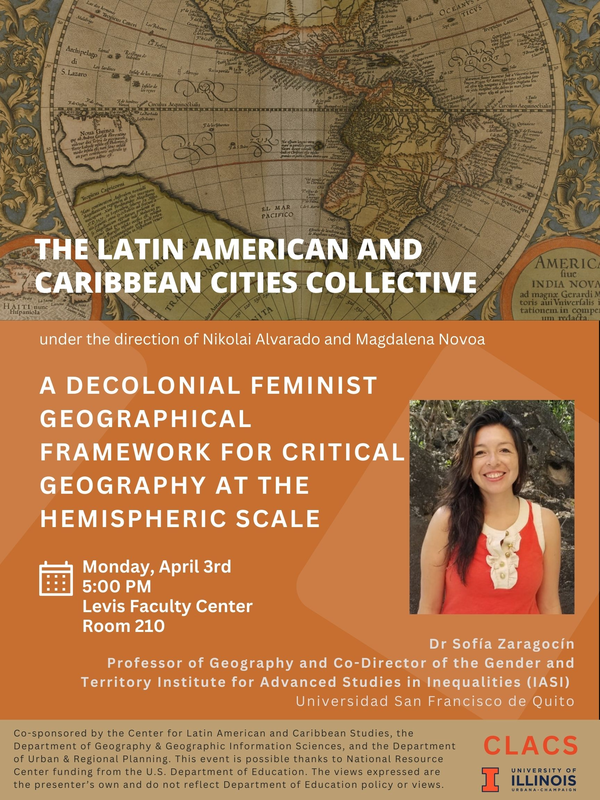LAC Cities Collective. Dr Sofía Zaragocín (Geography, Universidad San Francisco de Quito) "A decolonial feminist geographical framework for critical geography at the hemispheric scale."

- Sponsor
- Center for Latin American and Caribbean Studies, Department of Geography & GIS, Department of Urban & Regional Planning
- Views
- 471
A decolonial feminist geographical framework for critical geography at the hemispheric scale.
Across the Americas, there are common narratives and praxis on decolonial place-making. In this talk I explore what a decolonial feminist geographical framework looks like for critical geography at the hemispheric scale. The hemispheric offers an alternative geographical spatial imaginary where different forms of resistance to colonial spatial formations are possible. For example, it is from this scale that we can analyze the connections between decolonial spatial categories such as Abya Yala, Améfrica Ladina and Turtle Island. There are also clear links that tie the hemispheric with embodied notions of territory such as the relationship between land-body and cuerpo-territorio (body-territory) epistemologies and methods. And finally, we can make room for uncomfortable feminist discussions such as the link between Latinx and Latin American critical geographies. At the heart of this proposal is a commitment to developing a decolonial feminist geographical framework that prompts relational and antiracist understandings of territories.Workshop: Feminist geographic methodologies stemming from Abya Yala and Améfrica Ladina.
There are important feminist geographic methodologies stemming from Abya Yala and Améfrica Ladina. This workshop will explore methodological approaches from decolonial feminist geographical frameworks that are happening across the Americas. We will review the epistemological and methodological debates behind particular social cartography methods as well as their application for research proposals.Sofia Zaragocin is a decolonial feminist geographer based at the Universidad San Francisco de Quito (USFQ), Ecuador. Her research focuses on developing Latin American decolonial feminist geography thought and praxis as well as connecting Latinx and Latin American geographies across the Americas. She has published widely in journals such as Antipode, Annals of the American Association of Geographers, Gender Place and Culture and others as well as co-edited two books Feminismo y Bueno Vivir: Utopias Decoloniales (2017) and Racismos en Ecuador, Reflexiones y experiencias interseccionales (2021). She is co-director of the Institute of Advanced Studies on Inequalities at USFQ and part of the Critical Geography Collective of Ecuador.